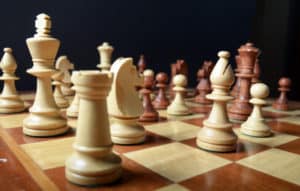
Beginners Chess Guide : Section 2
Section 2 deals with the Basic Chess Moves, Development, Pawn Structure, Exchanges, Game Types, Space, Time and Basic Strategy.
Basic Chess Moves
Most of SECTION II, of this Beginners Chess Guide is to do with the basics of Movement and Developing your army. Let’s get started …
Okay, open whatever Chess program available, then you can explore the Basic Chess Moves while you watch and read about them.
Find out how each piece moves and captures on the board. There are videos in this beginners guide … More
Development
This particular article ties together a few different topics, all closely related to Development, and attempts to clear up and explain the following aspects:
Development (an overview); Fianchetto; Hole; Positional; Quiet Move; Symmetry; Tempo; and Transposition. More
Pawn Structure
Pawns may be rubbish movers, but their low regard is part of their overall strength.
When used properly, together and developed into good Structures, Pawns can form the backbone that give strength to the attacks and threats by your heavy-duty pieces. More
Pawn Promotion
A Pawn’s ability to gain Promotion is it’s ultimate trump card, changing this slow-moving, low-value squaddie into a Piece with whatever powers they possess.
Pawns gain Promotion by reaching any square on the enemy’s back rank. Once there, the majority of the time you’ll promote to a Queen.
However, sometimes, it may be wiser to opt for Underpromotion, whereby you promote the Pawn to either a Knight, Bishop, or Rook. More
Chess Exchanges
Exchanges are deliberate trades of pieces … One player either captures, or just moves a piece, where an opponent’s piece will be able to capture back, immediately.
Some Exchanges swap the same Pieces – such as one Rook for another; other Exchanges have a definite Winner and Loser.
However, don’t get too confident, if you “Win the Exchange“, as your opponent could be better positioned and Win the Game. More
Chess Game Types
A Game of Chess can either feature plenty of clear space in the middle of the Board – which would make it an Open Game.
OR, the game can be more claustrophobic in the middle – if this is the feature of a game you play, then you’re having to contend with a Closed Game situation.
In this Beginners Chess Guide article, the Knights and Bishops take center stage – you need to know which piece prefers Open Games and which is better suited to Closed Game situations. More
The Principle Of Space
Taking a couple of minutes, to learn both “The Principle of Space” and “The Space Count System“, will enable you to determine whether it is you or your opponent, who currently holds greater territorial advantage.
This is most useful during the Opening phase, when the Board is cluttered with pieces, on either side, and it’s maybe a little tricky, at first glance, to determine who’s on top. More
The Principle of Time
The Time Principle refers to the Development of a player’s army.
In particular, it determines how efficient a player manages to mobilize their troops.
The quicker a side develops, during the Opening phase, the more likely they’ll gain a Time Advantage, which could prove critical to the outcome of a game. More
Basic Chess Strategy
There are literally hundreds of documented strategies and tactics in print or online – certain brain-overload for anybody, let alone beginners.
Here, we give you ONE good starting strategy to help you progress and learn the basics of the game … More










